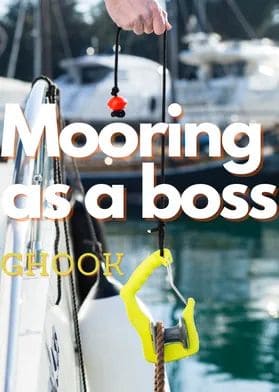Sale of Inflatable Cylindrical Fenders With Delivery
This page contains a catalog with prices for new inflatable cylindrical fenders for yachts and boats from the best manufacturers in the world. Fast delivery throughout Europe and quality assurance for all goods.
Need advice on which fenders to buy for a yacht? We will be happy to answer all your questions and advise you on how to choose the right fenders, how many fenders you need for a yacht and how best to attach them.
What Are Inflatable Cylindrical Fenders Used For:
Often at the docks on the sides of various boats you can see several tied devices of an elongated, oblong shape. These are inflatable protective fenders - their main task is to prevent friction of the boat’s hull against the walls of the pier, mooring piles or other yachts nearby.
Mooring a boat is not the same as parking a car - in marinas there are strong ebbs and flows that raise and lower the ship, leading to pier structures scratching the coating of the yacht. During the mooring itself, there are also high risks of collisions due to gusts of wind, inertia or rough seas.
For these reasons, before mooring, the captain and crew prepare and hang removable inflatable fenders from one or both sides - then the collision impact affects only the protective buffer, which absorbs it and dissipates the impact energy.
When maneuvering between other ships, towing, passing through narrow straits and lock chambers, rafting-up with another ship on the high seas, crews all over the world use factory-made or home-made hull protection. Maneuvering without fenders is a risky task that can be costly later on.
Cylindrical fenders are most actively used to protect the sides, and even if it is customary to moor bow-to or stern-to in harbors, it is often necessary to moor side-to at fueling stations for boats and yachts in strong bulk or dump wind. And in such situations, cylindrical fenders really shine, since they protect the board almost to the entire contact height - as a result, strong waves or a high pier in an unfamiliar place stop being a problem.
Advantages and Disadvantages of Inflatable Cylindrical Fenders:
Let’s look at the positive aspects and a number of disadvantages of cigar-shaped dampers.
The diameter of elongated fenders is usually smaller than that of round buoys and during mooring you have to be closer to the walls of the pier and neighboring ships, which means that the risks become higher, yet their advantage is that they take up much less space and are easier to store. Not every captain is ready to have 8-9 volumetric balls on a single-hull boat, where there are already problems with free space.
In addition, there are many marinas where the passage to the mooring place is so narrow that the port team’s main problem is to somehow distribute catamarans and yachts so that everyone has enough space to accommodate. In such a situation it is useful to have protection to the full height of the side and quickly switch fenders when needed.
In general, high mobility and the ease with which inflatable dampers are moved around the boat and from side to side is one of the distinguishing advantages of this type of fenders. They do not require constant rigid fixation, winches and hoists for installation and allow you to freely adjust the height depending on the situation.
When you have to squeeze through, almost pushing away other yachts, for small boats with six fenders, it is advised to hang four of them on the lee side and two on the opposite side. Sometimes when mooring next to ships of different heights, two sets of fenders can be placed so that one is above and the other is below the waterline.
Another positive aspect of cylindrical dampers is that they almost always have two mounting rings or one through hole and can be suspended in a horizontal position. This allows them to be used when it is necessary to protect, for example, the stern corner, when mooring independently or during sailing.
Such popularity among boatowners was ensured not only by an ergonomic convenient design, but also by modern manufacturing materials. This is often either high-damping rubber or PVC with high resistance to wear, impact, temperature extremes, ultraviolet radiation and decay.
And although inflatable fenders, unlike polyurethane ones, do not succumb to erosion from sunlight, the pumped air inside the chamber in the heat can expand and the damper can swell, deform and lose some of its shock-absorbing functions. That’s something that would never happen with good old car tires on the sides or logs upholstered in foam rubber.
Typically, standard inflatable fenders are optimal at 0.15-0.2 bars of pressure at around 20ºC. But fenders of dark shades heat up more actively and a black cover can cause similar effect. Therefore, many manufacturers strongly recommend periodically checking the pressure and not pump the dampers with a compressor too much - it should sag two or three centimeters when pressed.
How to Choose Cylindrical Fenders:
To protect the stern or bow, a cylindrical shape is not the most suitable option and it is better to place specialized devices or round fenders there. But just to protect the sides you will need a whole set of dampers - they are usually hung every 2.5-3 meters of the hull length and thus inflatable cylindrical fenders comprise the majority of protective products on the boat.
Many industrial manufacturers of inflatable shock absorbers have a table with calculations and recommendations for selecting fenders. But, of course, they cannot take into account all the individual characteristics that the boatowner faces. This is especially true for the length of the fender.
For example, if someone owns a pleasure yacht, does not plan long trips and is mooring in equipped docks at a floating pontoon that goes, like the ship itself, along with the tides, then 40-50 cm of fender length is enough for a twelve-meter boat with high side to protect it from friction and provide comfortable anchorage.
And in bays with a strong chop wave, severe weather conditions, stationary piers made of concrete or metal, it is strongly recommended to have long fenders for almost the entire height of the freeboard. In this situation, they are mounted vertically, with the valve up and so that the lower end barely touches the water, but does not float.
In terms of diameter, they declare the required minimum of 2.5 cm for every 120 cm of body length. But this is a minimum, of course - the thicker the fender, the better and safer it is, so it is advisable to play it safe and add a few extra centimeters of diameter.
In addition to dimensions, it is worth paying attention to the material used in making cylindrical fenders and its components and to understand whether it can withstand the intensity of the loads that it will face. With frequent and constant use, on long voyages, when changing climatic zones, not only the walls of the body are subject to wear, but also the pressure control valve and the eyes to which the ends are attached.
Reinforced body with thick walls and dense reinforced eyes will not allow the fender to come off, deform during rough waves and the damper will not turn into a bursting ball or get carried away into the sea. In such situations, it is better to purchase products from reliable manufacturing companies that have been proven over the decades.
Of course, side-tied fenders are also a way to emphasize the individuality and style of your boat - for this they use a variety of colors for different models, covers with drawings and inscriptions. The selection of fenders has long been not limited solely to their direct functionality.
How to Store:
Before choosing fenders, it is worth considering a place to store them - inflatable options are convenient in that they are suitable even for small yachts.
In this case, after going out to sea, you can simply deflate them and put them in the locker. Or you can store the fenders in special baskets fixed on the handrails or the wall of the cabin. Folding mounts and brackets are also suitable, on which the retracted fenders are fixed in place with ropes.
On land, they can be stored almost anywhere, a dry storage room works well. Keep them away from open flames, do not put heavy objects on them that can deform and damage the coating, do not allow contact with sharp, cutting surfaces and chemicals that react with PVC or rubber.
If they are stored in an inflated state, then the pressure should be checked a couple of times a year, as well as the condition of the fasteners and the valve. It’s better to conduct additional inspection before active use.


